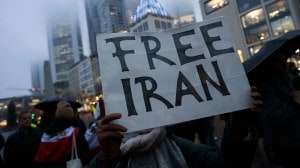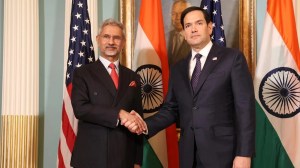Starr crossed
Stars portend omens -- signs good and bad. For President Bill Clinton, this Starr has proved to be a nightmare. A leader who was in the s...

Stars portend omens 8212; signs good and bad. For President Bill Clinton, this Starr has proved to be a nightmare. A leader who was in the seventh heaven, so to say, has not only been rudely brought down to earth, but sent hurtling down an abyss. Washington8217;s hyenaesque pundits have already pronounced that Clinton is toast. If he gets out of this jam, the man famously known as Slick Willie will fairly match Houdini8217;s best feat. Equally, if Starr has shone correctly, he will be known as the man who incinerated the most powerful individual on earth. Who is this Starr?
Not much is known about the Starr who is blazing across the world media now. To be sure, he did not start out as Clinton8217;s nemesis. In fact, when Kenneth Winston Starr middle name after Churchill; probably explains his bulldog tenacity first began his rather innocuous sounding inquiry into a 1978 Arkansas land deal, better known as the Whitewater scandal, he was a distant acquaintance of the Clintons through a mutual lawyer friend named AbnerMitva. As the Whitewater probe metamorphosed into a wider inquiry encompassing other alleged Clinton shenanigans, Starr actually came twice to the White House to depose First Lady Hillary Clinton. He arrived quietly and left by the back door, issuing a brief press release and making no statements, offering no leaks.
The Clintons were perhaps lulled into complacency by this. After all, Starr was an appointee of the administration, although under fortuitous circumstances. Attorney General Janet Reno accepted a recommendation by a three-member committee to appoint him after objections about another appointee. It was a costly political oversight. Under the controversial statute passed in the 8217;70s to check abuse of executive power, the Independent Counsel has sweeping powers, and unlimited time and money to investigate wrongdoing.
In the beginning, there was not a whiff of confrontation as Starr began his low-key inquiries. But somewhere along the way, the equations changed. One day, Starr summoned the FirstLady to testify in person before the Grand Jury in a courtroom. The White House was incensed. From then on, it was war. Democrats began an insidious attack on Starr, calling him a Republican stooge and denouncing his omnibus inquiry as a witch-hunt.
Starr8217;s Republican antecedents were no great secret. His all-Washington resume was peppered with GOP connections. As a freshman, he distributed literature for Richard Nixon in 1960. After excelling in law at Duke, he clerked for Justice Warren Burger before joining the prestigious law firm of Gibson, Dunn and Crutcher in 1981. When William French Smith, his mentor at the firm, became President Ronald Reagan8217;s attorney general, he brought along Starr as a top aide. Two years later, Reagan named Starr to the US Court of Appeals, making him the youngest judge in the country around the same time Clinton was serving as one of the youngest governors in the country. Soon after, Starr resigned to take up the job of solicitor general in the George BushAdministration.
Being young achievers is one of the many things common between Starr and Clinton. Both were born to poor families in the backward boonies in the south in the summer of 1946, Clinton in Hope, Arkansas, and Starr in Vernon, Texas. Both missed Vietnam 8212; Starr because of psoriasis 8212; and both are deeply empathetic, each feeling the pain of the underdog in his own way. Both are practising Protestants and avid joggers. But that8217;s where the similarities end.
Clinton came from a dysfunctional family with a journeyman for a father and an alcoholic for a stepfather. Starr8217;s childhood, steeped in religion and rectitude, was swathed by an all-encompassing family. His father was a minister in a local church who worked as a part-time barber to supplement income in a hard-scrabble existence. His mother, still alive and talking at 90 in Texas she8217;s probably given more interviews than Starr, was a towering presence, who spanked him when he erred. When Joe-boy 8212; as Starr was called 8212; grew up, he toocut hair and sold Bibles. But he was an academic achiever, president of his class in high school and voted the man most likely to succeed.
Starr moved to George Washington University in the 8217;60s at the height of the ferment over Vietnam. When wild-eyed youth in tie-dyed shirts were protesting outside, Starr wore jackets and tie to class and supported the war. He soon moved to Harvard, where he met Alice, whom he married in 1970. Today, the Starrs have a son and two daughters, one of whom, by a quirk of circs, is now a year junior to Chelsea Clinton in Stanford. Evidently a perfect family man, TV crews parked outside his modest house in the upscale Mclean suburb capture him on the morning jog, at the end of which he brings coffee for the family from a nearby Starbucks. As he departs to his office a short while later clutching his cup of Starbucks coffee, a tight smile is all he spares for reporters hungering for interviews or at least a quote.
But those who have spoored him across the country on hisspeaking engagements say he is a deeply moralistic man who feels strongly about principles and public conduct. He speaks often about civic virtues, of right and wrong. In one recent address, he urged lawyers to take the moral high ground of Atticus Finch, the brave lawyer in Harper Lee8217;s To Kill a Mocking Bird. Truth, Starr told a group of lawyers in June, is the legal system8217;s abiding value.
As a husband and a father, he seems quite a martinet. An interviewer once asked Alice Starr what they did for entertainment. She said they went on long drives through the country on Sundays: she drove while he read. When the children were younger, he tortured them by playing tapes of famous historic speeches. He once drove his daughter, then barely six, to tears by making her name all the American presidents in chronological order. He is also still deeply religious. He sings hymns every morning as he jogs. On the drive to office, he listens to Christian radio.
If all this makes him sound like some religious zealotand a right-wing Republican stooge, his friends argue otherwise. They point out that as Bush8217;s solicitor general, he went against the President and sided with whistle-blowers against defence contractors. Another time, he ruled in favour of an artist whose subway mural lampooned Reagan. These are not signs of a bigot out to get Clinton, his supporters say.
The American people are not so sure. At least not till now, although that could be changing. One poll last year showed Starr had a favourable rating of only 26 per cent and an unfavourable rating of 53 per cent, compared to 60 favourable: 36 unfavourable for Clinton. But Starr apparently is unperturbed. He thinks he is just doing his job. In a rare interview given some months back, he said: 8220;My job is to chop the wood that is before me to chop.8221; Whoever thought that in the process he would almost bring down the executive branch.
- 01
- 02
- 03
- 04
- 05































